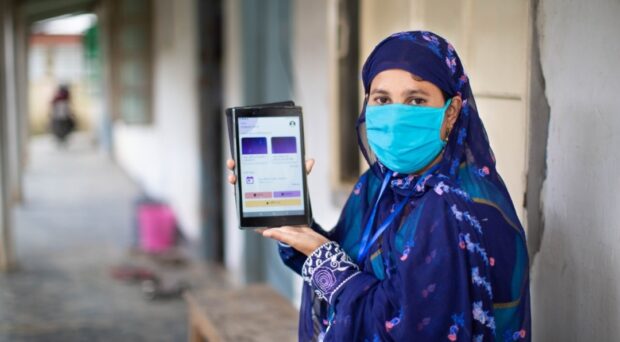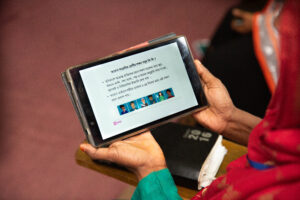
Community health workers (CHWs) regularly bring essential health services and education right to people’s doorsteps. Leveraging their lived experience and understanding of local realities, they are often the first point of care for vulnerable and under-served populations in resource-constrained settings. CHW interventions are contributing to a decline in child marriage, maternal and neonatal mortality and increases in family planning and diabetes self-management across countries.
The unprecedented COVID-19 pandemic prompted CHWs worldwide to not only rethink ways of delivering primary health care, but also how to act as a trusted source of information during an unpredictable time.
The Shasthya Kormis (SK) – a cadre of experienced CHWs at BRAC (A large NGO based in Bangladesh) – were no different. Armed with basic training, an Android tablet, and primary non-communicable disease screening devices, these 4500 SKs make regular visits to households and link them to institutional care through government hospitals in their locality. Controlling the spread of COVID-19 in Bangladesh in mid-2020 meant limited access to facility-based healthcare and the community relied on SK’s support more than ever. Many SKs reported that rumors and misinformation were spreading fast in their community and raising risk awareness was the need of the hour.
To address this, however, SKs needed to adapt to new protocols frequently and learn new information and methods to provide support. As lockdowns continued across Bangladesh, SKs could no longer rely on in-person, group sessions to stay up to date as they once had.

This is when the health program of BRAC, in collaboration with a team from Shahjalal University of Science & Technology (Sylhet, Bangladesh), kickstarted the development of Dishari: a remote learning platform to train SKs on raising risk awareness and addressing misinformation regarding COVID-19 in the community; emphasizing the effectiveness of preventive measures; safe practices for engaging with patients during the COVID-19 outbreak; and the continuity of care for non-COVID-19 health needs (such as maternal and child health).
Considering the background of the SKs (who have some limited digital literacy from regular use of Android tablets), the project team designed a lightweight, android-based app with a simple interface in Bangla, without the need for extensive typing. The courses consisted of images and short videos, while exams consisted of multiple-choice questions. Senior medical officers within the health program were consulted to ensure the most up-to-date advice was available. One component integrated into the system assessed the knowledge level of each SK and guided them accordingly. Another component, a supervisor dashboard, compiled aggregate data on users’ learning performances and pushed out important messages.
Although it was initially challenging for the project team and developers to work remotely, collaborative tools were leveraged to bridge this gap later. The prototype of the app was tested in two locations: Dhaka, covering a pool of SKs in an urban setting; and Khulna, covering a rural setting. As preparation, in-office training was conducted in the branch offices, with attendees and trainers maintaining strict social distancing and safety protocols. The training sessions were overseen by the area managers, who also installed the app on every participant’s tablet. The participants became acquainted with the app with the help of the area manager, who walked them through a course, after which the class completed an exam on that topic together. After reviewing the problem-solving process in the app, they independently completed another set of courses and exams. Subsequently, the participants shared their feedback on the initial version of the application and completed another round of training from home, which came with a deadline enforced within the app.
The initial testing yielded promising results among participating SKs who were able to demonstrate high knowledge retention after using Dishari. During focus group discussions, they indicated that the platform was easy to use and enhanced their knowledge of health topics.
Following the launch of the app on the Google Play store in June 2020, it was successfully piloted to train the SKs working under BRAC’s first comprehensive COVID-19 response project in Gazipur (Bangladesh), which directly impacted 300,000 people.
Remote training platforms can play a key part in rapidly equipping health workers with the necessary knowledge in the face of an epidemic or pandemic and ensure continuous learning for essential health workers. In recent times, Dishari has been mainstreamed across the health program of BRAC to ensure capacity continues to build for the 3,685 community health workers across 51 districts, who serve a catchment population of 58 million.
Comments